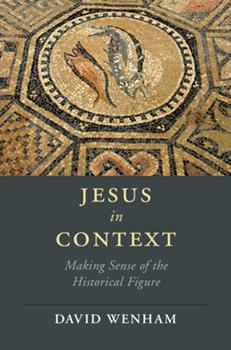Q. One of the things that recurs in your study is the fact that differences in the Gospel accounts, and in this case particularly in the passion and resurrection narratives rather than being a weakness, are actually a historical strength, because they bear witness to the fact that there were a variety of traditions, oral and written, not just one tradition that was copied by the other evangelists. Certainly, the unique stories in Matthew and Luke about the crucifixion and its aftermath did not come to them from Mark. And sometimes modern scholars are guilty of a surprising amount of anachronism— assuming that ancient histories or biographies would be written according to modern standards for such works. I’ve debated Bart Ehrman on this matter and kept saying to him you are treating the Gospels as if they were 4 photographs but actually they are more like four interpretive paintings— say like the famous multiple paintings of Rouen cathedral by the great Impressionist Monet. No one is comparing those paintings and asking— why is there a yellow dot at this precise spot here whereas in the next painting it is a red dot? But then too, as you do, we have to take into account the editorial work of each Evangelist. In ancient works like these Gospels there was a certain amount of freedom and flexibility in how the historical tale would be told, with different details and different emphases. In other words, the differences between the Gospel accounts are often deliberate, reflecting the writers’ emphases. In the end, Jesus was such a complex and important historical that we should be thankful we have 4 portraits instead of one, which look at the Christ event from differing perspectives. No one portrait could have done him justice. To me the fact that Matthew takes over some 95% of Mark with a 52% verbatim rate and yet manages to also give us much unique material not found in Mark is very telling—- yes, he is following a tradition, but no, he is not confined to his Mark source– even in the common material he feels free to add and subtract to make his points. Now I mention all of this because I think the big problem with many many modern assessments of the Gospels is that they are done by modern persons, including modern historians, and they bring their own gestalt to the reading of the material, complete with their assumptions, sometimes with their agnosticism or bias against things they would call primitive beliefs in the supernatural. Would you agree with this overall assessment?
A. I agree with you – again. I would underline what you say about Matthew not being confined to his Markan source. Modern scholars fail to reckon adequately with the importance and strength of oral traditions of Jesus in the first century after Jesus. We live in a book- and writing- culture – or at least we did until the advent of very modern media – but in the time of Jesus the ‘default setting’ was passing things on orally from person to person. Education was like that in the time of Jesus (and indeed until the last century): rote learning was the norm, and typically remarkably effective and accurate. The first Christians ‘passed on’ the stories and sayings of Jesus (see 1 Cor 11:23 and 15:3). And so, although I agree with most scholars that Matthew and Luke probably knew Mark, their prior source of information about Jesus will have been the stories of the Lord as recounted in church. And so although their portraits of Jesus often reflect their differing perspectives and priorities, their differences are often just differing selections from the received oral tradition. They are four independent witnesses, and we know that a variety of eyewitnesses to an event, for example in court, will often give us different but complementary angles.
Q. I love the way you end the book, especially with the quote from Speth. The great danger of the technological revolution is the assumption that science and technology can fix everything and cure all our ills. I was struck by how the quote from Speth which refers to selfishness, greed and the like mirrors Jesus’ own words that the real uncleanness comes out of the human heart— war, adultery, murder, narcissism and the like. And we are now seeing all of that in real time on TV day after day in Ukraine. What would Jesus say and do in our situation? How would you answer that question as we conclude our dialogue.
A. I have no doubt that he would weep over the events in Ukraine, as he wept over Jerusalem, and that he would weep over the sins of Russia, Ukraine and the Western world that have contributed to the modern situation. He would at the same time promise that the Son of man will come in final victory, and in the meantime he would encourage us to ‘keep awake’ spiritually and in prayer. Scholars tend with monotonous regularity to translate the Greek word gregorein as ‘to watch’. But in modern English ‘watch’ no longer means ‘stay awake’: Jesus’ injunction is a reminder that it is all too easy to fall asleep spiritually – in face of the great dangers that we face as human societies . Jesus stayed awake and went to the cross, for us as Christians believe; the disciples fell asleep and failed Jesus. Jesus’ call to stay awake – he warned of wars, plagues, famines and false prophets – continues to be urgent and relevant. So does his promise of his coming and the hope that it represents.













